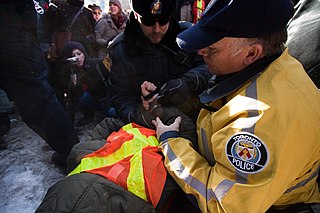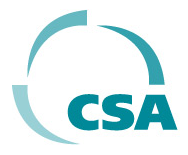
The National Labor Relations Act of 1935, also known as the Wagner Act, is a foundational statute of United States labor law that guarantees the right of private sector employees to organize into trade unions, engage in collective bargaining, and take collective action such as strikes. Central to the act was a ban on company unions. The act was written by Senator Robert F. Wagner, passed by the 74th United States Congress, and signed into law by President Franklin D. Roosevelt.
Collective bargaining is a process of negotiation between employers and a group of employees aimed at agreements to regulate working salaries, working conditions, benefits, and other aspects of workers' compensation and rights for workers. The interests of the employees are commonly presented by representatives of a trade union to which the employees belong. A collective agreement reached by these negotiations functions as a labour contract between an employer and one or more unions, and typically establishes terms regarding wage scales, working hours, training, health and safety, overtime, grievance mechanisms, and rights to participate in workplace or company affairs. Such agreements can also include 'productivity bargaining' in which workers agree to changes to working practices in return for higher pay or greater job security.
The Graduate Student Organizing Committee (GSOC) is a labor union representing graduate teaching and research assistants at New York University (NYU).
The Temple University Graduate Students Association (TUGSA) is a graduate employee union that is located at Temple University in Philadelphia, Pennsylvania, in the United States.
The Federation of Hospital And University Employees is a coalition of labor unions in New Haven, Connecticut, United States, which represents thousands of workers at Yale University and Yale New Haven Hospital. The federation currently includes recognized unions UNITE HERE Locals 34 and 35, which represent university food service, maintenance, and custodial workers, and clerical and technical workers, respectively. UNITE HERE has also, for the last fifteen years, supported the organizing efforts of graduate student teachers and researchers in the Graduate Employees and Students Organization. Finally, the Federation also includes the 150 dietary workers at Yale New Haven Hospital who are members of Local 1199NE of the Service Employees International Union (SEIU). Since 1998, this union has conducted an organizing campaign of about 1,800 other blue-collar service workers at the hospital. On March 22, 2006, the union and hospital agreed to an agreement governing the conduct of both parties in a neutral election process by which hospital employees will be able to vote on whether to unionize.
Graduate student employee unionization, or academic student employee unionization, refers to labor unions that represent students who are employed by their college or university to teach classes, conduct research and perform clerical duties. As of 2014, there were at least 33 US graduate employee unions, 18 unrecognized unions in the United States, and 23 graduate employee unions in Canada. By 2019, it is estimated that there were 83,050 unionized student employees in certified bargaining units in the United States. As of 2023, there were at least 156 US graduate student employee unions and 23 graduate student employee unions in Canada.
The Canadian Union of Public Employees, Local 3902 is a Canadian labour union local representing sessional lecturers, postdoctoral researchers and teaching assistants (TAs) at the University of Toronto, Victoria University in the University of Toronto, the University of St. Michael's College and New College in the University of Toronto.

The 2008–2009 York University strike was a strike by CUPE Local 3903, the union representing contract professors, teaching assistants, and graduate assistants at York University.

The Council of School Supervisors & Administrators (CSA) is a New York City based collective bargaining unit for principals, assistant principals, supervisors and education administrators who work in the New York City public schools and directors and assistant directors who work in city-funded day care. It was founded in 1962 as the Council of Supervisory Associations.
Graduate Employees Together – University of Pennsylvania (GET-UP) is a group of graduate students at the University of Pennsylvania that is trying to become recognized as a union. The group, first formed in the spring of 2001, and affiliated with the American Federation of Teachers (AFT). In 2004, according to exit polling by The Daily Pennsylvanian, the limited set of University of Pennsylvania graduate student employees included in the bargaining unit voted for unionization; however, the National Labor Relations Board (NLRB), before the votes were counted, decided that graduate students in private universities are not employees, while graduate students in public universities may be employees. The group began to re-form in 2016, and re-affiliated with AFT in October 2016. On March 2, 2017 the group once again decided to go public with their unionization campaign. The group has not been recognized by the University as a union for the purposes of collective bargaining.

The Teaching Assistants Association (TAA) is a graduate student employee union formed at the University of Wisconsin–Madison in 1966. It is credited as the first graduate student labor union. Following voluntary recognition by the university as the teaching assistants' bargaining agent in 1969, negotiations resulted in a 1970 strike, which secured "bread-and-butter" gains such as job security alongside grievance procedures. Their major unmet demand from their strike—the inclusion of teaching assistants and students in the course planning process—went unfulfilled. The TAA struck again in 1980 and lost its union recognition until 1986. The union's protest at the Wisconsin State Capitol building began the 2011 Wisconsin protests.

The 2018 York University strike was a strike by CUPE Local 3903, the union representing contract professors, teaching assistants, and graduate assistants at York University. At 143 days long it is the longest strike in the post-secondary sector in Canadian history, surpassing the previous record of the 1976 Laval University 108-day strike. It ended on July 25, when the Ontario Legislature passed the Urgent Priorities Act back-to-work legislation.
The Harvard Graduate Students Union (HGSU), officially known as Harvard Graduate Students Union United Auto Workers (HGSU-UAW), is a labor union representing graduate students, teaching assistants, and other student employees at Harvard University. The bargaining unit comprises about 5,000 student employees, including graduate students working as research assistants and teaching fellows as well as several hundred undergraduate students holding teaching positions. Contract negotiations with the university are scheduled to begin in Fall 2018. HGSU is affiliated with the United Auto Workers labor union, whose 400,000 members include 45,000 graduate students and 30,000 academic workers.

The 2020 Michigan graduate students' strike was a labor strike launched by the Graduate Employees' Organization 3550, the graduate student employee union that represents approximately 2,100 graduate student instructors at the University of Michigan in Ann Arbor, Michigan, United States. The main cause of the strike was related to graduate students' objection to the university's plans for reopening during the COVID-19 pandemic. Additional calls were made by the union for defunding the campus police. The strike started on September 8, 2020, and was scheduled to last for four days, with a subsequent vote extending the strike for another week. Following the start of the strike, resident assistants and student employees for the university's dining services announced they would also strike over similar concerns regarding the university's COVID-19 policies.
The 2021–2022 Columbia University strike was a labor strike involving graduate student workers at Columbia University in New York City. The strike began on March 15, 2021, and ended on May 13, 2021. However, additional strike action commenced on November 3 and lasted until January 7, 2022, when a tentative agreement with the university was reached. The strike was organized by the Graduate Workers of Columbia–United Auto Workers Local 2110 (SWC–UAW), a labor union representing student workers at the university. The goals of the strike were an increase in wages, increased healthcare and childcare coverage, and third-party arbitration in cases of discrimination and sexual harassment.
The 1979 Boston University strike was a labor strike involving employees at Boston University, a private university in Boston, Massachusetts, United States. The strike, involving faculty members, clerical workers, and librarians, began on April 5 and was fully ended by April 23.
Graduate Employees' Organization 3550 is a labor union representing the over 2,000 Graduate Student Instructors (GSIs) and Graduate Student Staff Assistants (GSSAs) on the three campuses that make up the University of Michigan (U-M).
Student Researchers United-UAW (SRU-UAW) was a union representing student researchers at the University of California (UC). It was part of the United Auto Workers. The union was composed of more than 17,000 people who work across 10 UC campuses and the Lawrence Berkeley National Laboratory. They were the largest 2021 addition to the UAW, accounting for 0.1% of union members in the US, and, according to organizers, were "the largest academic student employee union in US history." The union later joined UAW 2865 and ceased to be an independent entity.

The 2022 University of California academic workers' strike was a labor strike at all campuses of the University of California (UC) system, including the Lawrence Berkeley National Laboratory. On November 14, some 48,000 academic workers went on strike for better pay and benefits. Led by the United Auto Workers (UAW) labor union, it was the largest strike in the United States in 2022; union organizers describe it as the largest strike in all of U.S. higher education.







